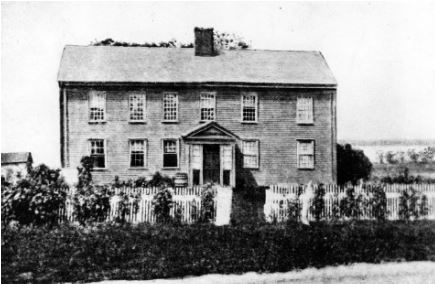How tragic is it when an innocent person goes to prison or is wrongfully convicted and sentenced to death? Our judicial system is suppose to be fair. However, there have been numerous cases in which a defendant has been pronounced guilty, but is later found to be innocent. The case of Thomas Cornell is an example of this. He was sentenced to death for murdering his own mother, Rebecca Cornell. There is no evidence for the death of Rebecca, yet I argue that a jury wrongfully convicted Thomas. What happened to Rebecca Cornell that night remains a mystery. However, it is possible that Rebecca committed suicide, and it is also possible that a group of people from the outside broke in and brutally murdered her. These plausible scenarios are, in fact, more probable than is the case for Thomas, her own son, murdering her.

Seventy-three year old Rebecca Cornell’s last moments on this Earth have had to have been one of the strangest, most peculiar moments ever. In early February 1673, Rebecca was found burnt, with flames all around her, lying some distance away from the hearth in the downstairs room of her house when Sarah, Thomas’ wife, had asked their son to ask Rebecca if she wanted something to eat. However, when he went downstairs, he noticed Rebecca’s body so badly burnt that he almost could not recognized her.1 Hours before this occurred, Thomas had spent more than an hour talking with his mother when he decided to go upstairs with his wife and kids. He had left his mother peacefully sitting by a large fireplace in her bedroom smoking a clay pipe.
According to the jury, Thomas Cornell may have murdered his mother, but there are other plausible explanations for what could have happened that night. For one, Rebecca could have committed suicide. James Moills, a good friend of Rebecca, testified that on the day of Rebecca’s death, he had noticed that Rebecca had looked ill, and did not seem herself on the day of her death. He then said that he continued to check up on her throughout the day to make sure that she was okay. Rebecca was ill the entire day on the day of her death. This meant that Rebecca could have fallen by the fireplace by herself. Ill people tend to feel clumsy due to how bad their body is at that state, resulting in less self control.2
Another possible reason for what could have happened on the night of Rebecca’s death is that she could have been murdered by a person or a group of people because two days after Rebecca’s death, John Briggs, Rebecca’s brother in law, claimed he was visited by Rebecca’s ghost, who stated, “Twice sayd, see how I was burnt with fire?” Rebecca was trying to tell her brother-in-law that her death was no accident. She failed to accuse the specific person of her death, but told Briggs that it was someone. Briggs took his testimony to the court and told the officials what he had seen. In the seventeenth century, protestants believed that the spirit of a dead person would appear if there had been “an injustice that might not be detected by other means.” They believed that such a spirit’s appearance was God’s way of ensuring that a murderer would be exposed.3 This then helps me conclude that Rebecca could have been murdered by a person or group of people, because two doors are connected to Rebecca’s bedroom. One is connected to the inside of the house while the other is connected to the outside. People from the outside had access to Rebecca’s bedroom, and if executed promptly, a number of people could have gone into Rebecca’s bedroom and murdered her and been able to escape swiftly without anyone having known. But if a person or a group of people did this, why did they do it? Could it have been because of her family’s reputation?4

Thomas Cornell Sr. and Rebecca Cornell lived in Portsmouth, Rhode Island, along with their four daughters and three sons. They formerly lived in Boston, where they had planned to stay for the rest of their lives when they arrived from England in 1627. Thomas Sr. and Rebecca Cornell bought a house and 112 acres in Boston from William Baulston, a settler who abandoned Boston to go to Portsmouth, a new settlement Rebecca’s brother, John Briggs, along with other settlers had found.5 In 1640, Thomas Sr. and Rebecca Cornell’s family decided that it was best to leave Boston and move to Portsmouth due to a number of fines Thomas Sr. had received. The fines consisted of drinking heavily at the pinnace, selling wine without a licence, and selling beer above the maximum allowable price. As soon as they arrived in Portsmouth they were welcomed, and they immediately made Thomas Sr. a freeman meaning he was able to purchase land in Portsmouth and within a year Thomas Sr. had been granted meadow land and made constable of Portsmouth. In the next couple of years, Thomas Sr. prospered in Rhode Island. The Governor Kieft of New Netherlands awarded Thomas a tract of land in 1646, seven months before the town of Portsmouth allotted him 100 acres of land where his widow would meet her tragic death more than a quarter century later.6
The jury was wrong in accusing Thomas for the murder of his own mother. However, the jury’s information about Thomas that led to his conviction was mainly based on Thomas’s relationship with his mother. Their relationship was filled with bitterness and hatred that was badly fueled with financial conflict.7 Despite Thomas living in his mother’s household, Rebecca made Thomas verbally pledge that he would pay rent to her while also providing and paying for a maid to take care of her during her remaining years.8 To continue this bitter relationship, in Rebecca’s will, all of her estate was to be equally divided among her children, whom she listed by name. All of her sons and daughters received a part of Rebecca’s property, such as clothes, valuable objects, and even one of her daughters, Mary, inherited her mother’s gold ring. All the children except for Thomas was mentioned in Rebecca’s will. Even Thomas’s first wife was mentioned in her will. This was because Thomas was the only son living with his mother, along with his wife whom Rebecca loved. Unfortunately, Thomas’ wife died a couple years after Rebecca signed her will. Shortly after, Rebecca was asked as to why she did not live with any of her other children. She said that if she knew Thomas’ wife was going to pass, she would have left years ago.9 This shows how bitter Thomas’ relationship with his mother really was. Despite their relationship, this does not mean that Thomas necessarily murdered his own mother. Almost every human beings argues with their mother, its just what we do; however, we don’t go and murder our own mothers.

Although the case of Thomas Cornell was closed, it was never solved. The jury found Thomas guilty of murdering his mother, but his decision was not certain. The testimony suggests that Thomas had the opportunity to kill his own mother; however, that doesn’t necessarily mean he did. There was no one there to see the death of Rebecca, nor was there a murder weapon found at the scene. To this day, this mystery has not found the proper reason as to what happened to Rebecca Cornell for her tragedy on February 8, 1673.
- Cornelia Hughes Dayton, “Getting Beyond ‘Who Done It,'” in Common-Place (2003): 1. ↵
- Elaine Forman Crane, Killed Strangely: The Death of Rebecca Cornell ( Ithaca: Cornell University Press, 2002), 114. ↵
- Cornelia Hughes Dayton, “Getting Beyond ‘Who Done It,'” in Common-Place (2003): 1. ↵
- Elaine Forman Crane, Killed Strangely: The Death of Rebecca Cornell ( Ithaca: Cornell University Press, 2002), 114. ↵
- Elaine Forman Crane, Killed Strangely: The Death of Rebecca Cornell ( Ithaca: Cornell University Press, 2002), 61-62. ↵
- Elaine Forman Crane, Killed Strangely: The Death of Rebecca Cornell ( Ithaca: Cornell University Press, 2002), 65. ↵
- Elaine Forman Crane, Killed Strangely: The Death of Rebecca Cornell ( Ithaca: Cornell University Press, 2002), 106. ↵
- Cornelia Hughes Dayton, “Getting Beyond ‘Who Done It,'” Common-Place (2003): 1. ↵
- Elaine Forman Crane, Killed Strangely: The Death of Rebecca Cornell ( Ithaca: Cornell University Press, 2002), 79-80. ↵



69 comments
Alison Morales-Aguilar
I’ve never heard of this case before but I think the weirdest thing about it was the fact that Brigg’s mentioned he saw Rebecca’s ghost and said that the ghost said that she was murdered by someone and didn’t say who killed her. I thought it was crazy that the judge allowed this to happen as I imagine you can just lie about seeing the ghost to get away with something.
Reagan Clark
This is horrible (not the article, the story)! Why would a jury execute someone without any evidence? They even allowed testimony from someone claiming they saw the ghost of the victim? What?!? This article showed how messed up the trial is. They handled everything poorly. He should not have been executed or convicted without solid evidence. This is sickening that the government allowed this to happen.
Melanie Fraire
This article was very interesting since there’s a lack of evidence to come to any conclusion of whether it was a murder done by a stranger or a murder done by her own son however, the most believable theory to me would probably be that it was maybe an accident. Either way this case is very strange and it’s very old so I don’t expect there to be much evidence .
Juliana Montoya
I had never heard of the supra about this man, but the fact that the jury had wrongfully accused him of doing such a horrible thing proves that the judicial system is messed up. The part of this story that was most disappointing was the fact that they had accused him off of just a few pieces of evidence and they did not d a further investigation.
Sofia Almanzan
This article is interesting because it shows problems with humans over our whole existence. Many people want to feel safe so they fit theories to fit facts not the other way around. That is how the jury was able to believe just because he had issues with his mother that he killed her. This article reminded me of the wrongful conviction of Timothy Cole in the 90’s. He died in jail before he could be released when the statue of limitations was up the actual rapist confessed.
Antonio Holverstott
There is a small detail that points to the conclusion that Thomas did not murder his estranged mother, sound travelling upstairs into the ears of Thomas’ family. In many cases when someone is about to commit a violent crime upon someone else, the victim audibly screams for help and there are sounds of an apparent struggle. The family did not report any such sounds.
Sara Guerrero
Wow great mystery indeed I’m confused as to what happened to Rebecca, but if her son Thomas really hated her so much he would have killed her much sooner and there would definitely have been evidence. Maybe Rebecca did commit suicide and before she did she tried to stage the whole thing like it was her son’s fault. Yet, it’s hard to tell with the scarcity of evidence and no testimonies great story!
Melissa Garza
Great article Bictor! I absolutely love reading about mystery/unsolved cases because there’s always so many logical theories. Maybe the brother claimed to see the ghost to try and help cover something up and take the pointing finger away from someone else. Though its strange to think who. Suicide, like you said, might also be a possibility, being that she was in the downstairs room all by herself.
Andrea Degollado
This article was very interesting to read and still left you wondering as to what exactly happened to Thomas mother. I think it’s truly awful to read about someone that was accused of murdering their mother, however there is a lack of evidence that Thomas really did murder his mother. Although there is evidence that his mother and him did not have the best relationship it doesn’t explain why he would murder her, there is no motive. This article was very well written and left the reader wanting more.
Michael Thompson
I thought this was super weird. I am left wondering, did he really kill his mother? Because the way he went about it is just cruel. I get that it was set up to look like an accident, but to burn someone has to be to the cruelest way to kill someone, and to do that to your own mother, even if there was a strained relationship, is sick. And I don’t get why she was still living with him when she had other children who she liked more. It’s just weird.